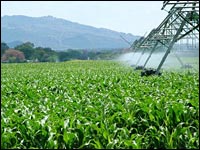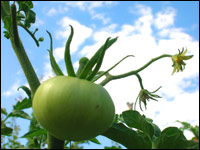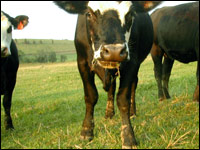sustainable agriculture
-
Why The Economist’s recent assault on “ethical food” missed the mark
Last month, the influential British newsweekly The Economist took the measure of the sustainable-food movement and found it wanting. “There are good reasons to doubt the claims made about three of the most popular varieties of ‘ethical food’: organic food, fair-trade food, and local food,” the journal declared, and proceeded to subject each to withering […]
-
Locally grown food shouldn’t be just for those with cash to spare
As a critic of the globalized industrial food system, I often face charges of elitism — in part, likely, because I neglect to acknowledge the system’s clear achievements. So here goes. In the mood for good food? Look no further than your backyard. Photo: iStockphoto In human history, few pampered Roman emperors or African kings […]
-
An innovative Alabama CSA shows the way forward.
When Wal-Mart announced plans to become the world's biggest purveyor of organically grown food last week, the polite applause from the enviro gallery grated on my ears. (Here's a spirited recent debate on Gristmill.) Even the New York Times editorial page could see through this move. While some greens cooed at at Wal-Mart's magnamity, the Grey Lady unleashed an appropriately cynical analysis:
There is no chance that Wal-Mart will be buying from small, local organic farmers. Instead, its market influence will speed up the rate at which organic farming comes to resemble conventional farming in scale, mechanization, processing and transportation. For many people, this is the very antithesis of what organic should be.... For "Wal-Mart" and "organic" to make sense in the same sentence, the company will have to commit itself to protecting the Agriculture Department standard that gives "organic" meaning.
I have no doubt that Wal-Mart's greenie admirers will hold the company's feet to the fire on that one. But the USDA's organic standards are already being drained of meaning. Rather than chide Goliath to behave nicely, enviros should consider helping David get his shit together. Check out what they're getting up to over in Birmingham, Ala.
-
A food-politics writer expresses angst at the obscurity of his topic

The other day, a prominent Canadian journalist paid me a visit to interview me for his book on building a sustainable future. At one point, I expounded on the closed-nutrient cycle of old-school organic farming, contrasting it with what writer Michael Pollan deemed the "industrial-organic" way. In the old-school organic style, which relies on animals, farm wastes are recycled into the soil, providing all the nutrients necessary for the next harvest. The industrial-organic farmer, by contrast, imports his or her soil fertility -- just like the conventional farmer. The difference is that the organic farmer is likely shipping in composted manure from far-flung places, while the conventional grower is hauling in a processed petroleum product.
"The problem," I continued -- my interlocutor's eyes may well have been glazing over -- "is that most small vegetable farms these days, including my own, don't have enough animals to produce the nitrogen we need. So our transition to real organic farming is ongoing."
The journalist then asked me a question that stopped me short: "Do you think real organic farming could feed the world?" I stammered something like "I hope so," and had him jot down a couple of books to look up. It wasn't until after he left that I realized why his question made me so uneasy.
-
How the feds make bad-for-you food cheaper than healthful fare
If you’re going to talk about poverty, food, and the environment in the United States, you might as well start in the Corn Belt. So good, and so good for you — until it’s turned into soda. Photo: stock.xchng. This fertile area produces most of the country’s annual corn harvest of more than 10 billion […]
-
Two new photo books focus on food
In the valuable new book Fields of Plenty: A Farmer’s Journey in Search of Real Food and the People Who Grow It, author Michael Ableman rambles across the country in a VW van, visiting small-scale farmers to talk with them at the table and in the field. Vine and dandy. Photo: Chrissi Nerantzi. Not surprisingly, […]
-
Sustainable-ag legend Joel Salatin can farm — but can he write?
Over the past 20 years, Joel Salatin has emerged as a sort of guru of the sustainable-food movement. His 500-acre Polyface Farm in Swoope, Va., is legendary among a small circle of foodies for its robustly flavored beef, pork, chicken, and eggs. Among farmers, Salatin has won cult status for his innovations in multi-species, pasture-based […]
-
Is agribusiness behind the ouster of one of its biggest critics?
 Plunked down in the land of huge, chemical-addicted grain farms and the nation's greatest concentration of hog feedlots, Iowa State University's Leopold Center for Sustainable Agriculture has always had a tough row to hoe.
Plunked down in the land of huge, chemical-addicted grain farms and the nation's greatest concentration of hog feedlots, Iowa State University's Leopold Center for Sustainable Agriculture has always had a tough row to hoe.Imagine trying to operate an Anti-Cronyism League from Bush's West Wing, and you get an idea of what the Leopold Center is up against. Industrial agriculture runs the show in Iowa, sustained by regular infusions of federal cash and its government-sanctioned ability to "externalize" the messes it creates. The state grabbed $12.5 billion in federal agriculture subsidies between 1995 and 2004 -- second only to Bush's own home state. Iowa leads all states in hog production: It churned out 14.5 million pigs in 2001 alone, the vast majority from stuffed, environmentally and socially ruinous CAFOs (confined-animal feeding operations).
Yet since springing to life in 1987 by fiat of the Iowa legislature -- funded ingeniously by state taxes on nitrogen fertilizer and pesticide -- the Leopold Center has become an invaluable national resource for critics of industrial agriculture and seekers of new alternatives.
Now, however, a sudden purge at the top has called the Center's much-prized independence from industrial agriculture into question.
-
To create a truly sustainable food system, we’ll need to make some fundamental changes.
The sustainable-food movement has a class problem.
Slow Food, for example, is an essential organization, with its declaration of a universal "right to taste" and its mandate to ...
... oppose the standardisation of taste, defend the need for consumer information, protect cultural identities tied to food and gastronomic traditions, safeguard foods and cultivation and processing techniques inherited from tradition and defend domestic and wild animal and vegetable species.
The group has undeniably done important work internationally toward those goals; yet its U.S. branch tends to throw pricey events accessible only to an economic elite.
Examples like this abound.


